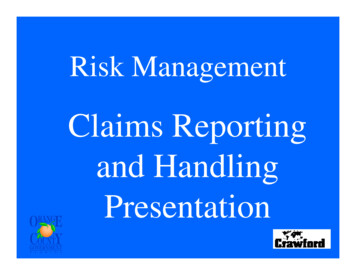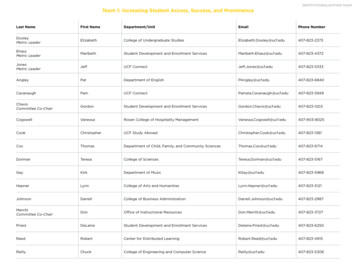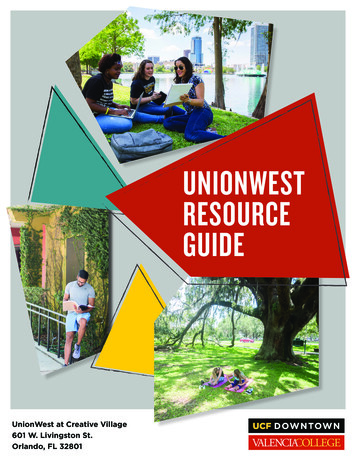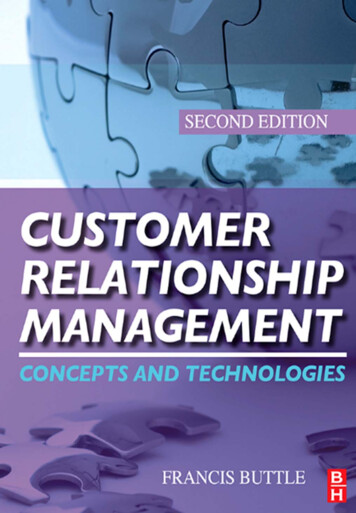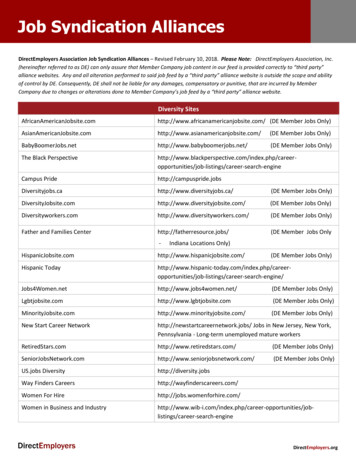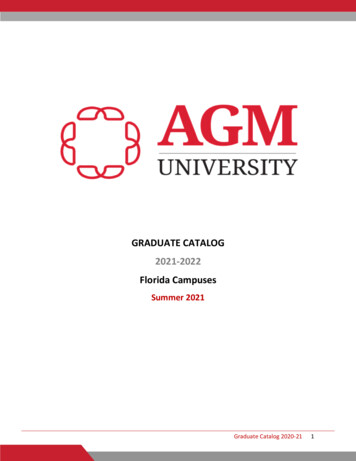
Transcription
ACC’s 2009 Annual MeetingDon't just survive. Thrive!Tuesday, October 202:30 pm–4:00 pm407 - Strategic Alliances: Opportunitiesand Issues in the Current Economic ClimateJason MeyerActing Assistant General CounselHeartland Payment Systems, Inc.Ray Chappell PhillipsAssociate General CounselKimball InternationalGregory SwinehartPartnerDeloitte Financial Advisory Services LLPThis material is protected by copyright. Copyright 2009 various authors and the Association of Corporate Counsel (ACC).Materials may not be reproduced without the consent of ACC.Reprint permission requests should be directed to ACC’s Legal Resources Department at ACC: 202/293-4103, ext. 338; legalresources@acc.com
ACC's 2009 Annual MeetingDon't just survive. Thrive!Faculty BiographiesJason MeyerJason Meyer is a corporate counsel and compliance leader, currently in transition. He isalso currently acting assistant general counsel for Heartland Payment Systems, Inc., inPrinceton, NJ.Mr. Meyer has experience heading business units and as a general counsel. Mr. Meyerwas chief legal officer, corporate secretary, and senior vice president, ethics andcorporate compliance for Kaplan EduNeering, a compliance solutions provider.Previously, Mr. Meyer was founder, president, and publisher of the LAWCAST audiolegal news services. Its publications included Intellectual Property LAWCAST,Corporate Counsel LAWCAST, Computer and Internet LAWCAST, and Employmentand Labor LAWCAST. He served as general counsel for that company (which has sincebeen sold), as well as for other media organizations. Mr. Meyer began his legal career asa litigator at Miami’s Steel Hector & Davis, and then in New Jersey at LowensteinSandler, and Dechert.Mr. Meyer is the chair of the ethics, governance, and compliance committee of the NewJersey Corporate Counsel Association (NJCCA). He also writes the blog LeadGood.orgon ethics in business leadership, and is a featured columnist for the websiteCorporateComplianceInsights.com -- the first person ever selected for that role. Inaddition, he is a Cub Scout den leader.Mr. Meyer earned his BA with high honors from Princeton University’s WoodrowWilson School and his law degree cum laude at the University of Pennsylvania.Ray Chappell PhillipsR. Chappell Phillips is associate general counsel of Kimball International, Inc. in Jasper,Indiana. Mr. Phillips’ main practice areas include U.S. and international commercialtransactions, corporate, M&A, real estate, intellectual property, and regulatorycompliance, as well as handling major project and litigation management. Mr. Phillipsjoined Kimball as associate corporate counsel and was later promoted to senior corporatecounsel. Kimball International, Inc. provides a variety of products from its two businesssegments: the electronic manufacturing services segment and the furniture segment. Theelectronic manufacturing services segment provides engineering and manufacturingservices, which utilize common production and support capabilities to a variety ofindustries globally. The furniture segment provides furniture for the office and hospitalityindustries, sold under the company’s family of brand names.Prior to joining Kimball, Mr. Phillips was associate director and general counsel ofCrescent Capital Resources, LLC in Durham, North Carolina.Copyright 2009 Association of Corporate Counsel2 of 28
ACC's 2009 Annual MeetingDon't just survive. Thrive!Mr. Phillips is a member of ACC, ABA, and the Indiana State Bar Association.Mr. Phillips received a BA from the University of North Carolina at Chapel Hill and hisJD from the University of North Carolina School of Law in Chapel Hill.Gregory SwinehartGregory Swinehart is the United States and North American managing partner ofDeloitte’s forensic and dispute services practice. In serving clients, Mr. Swinehart and histeam frequently work with alliance partners. He provides specialized economic,operational, and accounting consulting services to clients.Prior to joining Deloitte, he was a partner in a boutique consulting firm. Before gettinghis MBA and starting in the consulting world he was a product and process engineer at3M. Prior to his current roles at Deloitte, he led practices in Minneapolis, New York, andChicago. Mr. Swinehart has provided service to clients in a number of areas, includingeconomic modeling, valuation, bankruptcy consulting, and business processimprovement. He has extensive experience as an expert witness.Mr. Swinehart has been quoted in a number of major publications, he has publishedprofessional articles including a paper related to valuation considerations in commercialalliances, and he has given numerous presentations to professional groups. He is alicensed certified public accountant (seven states), a chartered financial analyst, and acertified management accountant. Mr. Swinehart serves or has served on a number ofboards of directors.Mr. Swinehart has an undergraduate degree, an MBA from the University of Chicago,and he completed all requirements but his dissertation for a PhD from the University ofMinnesota.Copyright 2009 Association of Corporate Counsel3 of 28
ACC's 2009 Annual MeetingDon't just survive. Thrive!Discussion Overview Three Phases of Any Alliance Starting, Continuing, Ending Implications from each phase: Drafting Negotiating Cost in a tight economy Summaries: Best practices in T’s and C’sStrategic Alliances: What are they? Definition:A strategic alliance is a formal,mutually-beneficial, long-term relationship betweentwo or more companies leveraging their respectivecore competencies to pursue a set of agreed upongoals while remaining independent organizations.Strategic Alliances: How are they structured? Equity Non-equity Example: Established corporate partner invests in smaller,rapidly growing technology company.Example: Automotive Tier 1 supplier company enters intodefinitive supply agreement with contract manufacturingcompany for supply of unique electronic steering systems.Joint Ventures Example: Alliance partners form a new entity to sell and todistribute over-the-counter pharmaceuticals.Copyright 2009 Association of Corporate Counsel4 of 28
ACC's 2009 Annual MeetingDon't just survive. Thrive!Phase One – Starting The Alliance: Overview Assessment / Valuation / PricingLegal Due DiligenceEthical Due DiligenceAttitudes, Fit and FeelWhen To Say “NO” (and how to say it) Summary: Top Ten Reasons To Not Do A Deal Best Contractual PracticesStarting the Alliance: Valuation Considerations Qualitative and QuantitativeQualitative Considerations Strategic Brand Sourcing Growth and Speed Make Vs. BuyFlexibility and IndependenceRiskHuman ResourcesStarting the Alliance: Valuation Considerations Quantitative Considerations Valuation High concentration of intangibles Rapid changes in value Heterogeneous contribution Asymmetric risk Temporary nature of commitment Option valueCopyright 2009 Association of Corporate Counsel5 of 28
ACC's 2009 Annual MeetingDon't just survive. Thrive!Starting the Alliance: Look Before You Leap Risks: Financial, Regulatory/Legal, and ReputationalAlphabet Soup:FCPA, Money Laundering, Economic Trade Sanctions, Gray Market,Politically Exposed Persons, International Trafficking in ArmsRegulations, Management Integrity, Corruption, Fraud,Environmental Due Diligence Process External AssessmentInterviewsBackground checksDocument ReviewAugments financial, strategic, and other due diligence issuesStarting the Alliance: Look Before You Leap Legal Due Diligence “Lite” Remember: Effective DD trumps reps and warrantiesEDGAR, Hoovers and Google! (Start a “Why? List”)Know the Top 5 Customers, Suppliers, Products, MarketsCredit Agreements and CovenantsPermits, Licenses and Restrictive CovenantsIP: Patents and TrademarksJudgments, Liens and Major LitigationInternational considerations include: Union claims may attach to equipment Antitrust/Competition RulesStarting the Alliance: Signs of a Lemon! Top 10 Reasons Not to Form an Alliance Timing: Window of Opportunity Disappearing RapidlyDistraction: Other Major Reorg/Acquisition UnderwayLimited Buy-In: Only the CEOs Are On BoardChampion/Critical Persons Retire or ResignInordinate Investment Required to Upgrade Process Technologiesor Fund InventoryIncompatible Business Processes/PlatformsMorphs into a ‘Transaction’: Price swamps the discussionAnswers to “Why? List” aren’t forthcomingDD Lite Results Are Concerning“Our cash burn rate .” is uttered by the other companyCopyright 2009 Association of Corporate Counsel6 of 28
ACC's 2009 Annual MeetingDon't just survive. Thrive!Starting the Alliance: Signs of a Lemon! Four More Reasons Not to Form an Alliance Attitude MismatchValues MismatchPerceived Lack of ParityYour Ability to Do A Deal is a Limited Resource!Phase One – Starting The Alliance:Best Contractual PracticesPhase Two – Continuing The Alliance: Overview IntegrationImplementation and OperationsMonitoringKey Issues Intellectual Property Compliance Summary: Best Contractual PracticesCopyright 2009 Association of Corporate Counsel7 of 28
ACC's 2009 Annual MeetingDon't just survive. Thrive!Continuing the Alliance: Integration Order & Procurement Systems (MRP/EDI)Supply Chain Buy-InDistributionQuality SystemsWarranty and Service FunctionsFinance/Accounting: Revenue/Cost SharingSafety and Environmental ProgramsCompliance ProgramsContinuing the Alliance: OperationsWho Does What? Broad guidelines v. detailed cookbook Passive voice v. active voice Vetted roles v. assumed rolesPick a paradigm Ease of agreement v. ease of operations(“Pay me now” v. “Pay me later”)Continuing the Alliance: Monitoring Transparency: metrics, tracking, and milestonesSystemsFlexibility including exit considerationsFrequent communication; steering committeesPeriodic reassessmentsAudit rightsThird party expertiseCopyright 2009 Association of Corporate Counsel8 of 28
ACC's 2009 Annual MeetingDon't just survive. Thrive!Continuing the Alliance: Intellectual Property Confidential InformationPre-existing IPIP Created During the Alliance Unilaterally JointlyNon-competes and non-solicitationExclusivityContinuing the Alliance: Compliance Should You Expand the Envelope? Legal considerations Reputational considerations How Should You Extend the Envelope? Standards Training CovenantsPhase Two – Continuing The Alliance:Best Contractual PracticesCopyright 2009 Association of Corporate Counsel9 of 28
ACC's 2009 Annual MeetingDon't just survive. Thrive!Phase Three – Ending The Alliance: Overview Cash Issues and “The Deadbeat Partner”Breach and TerminationThe Tail Summary: Best Contractual PracticesEnding the Alliance: Thoughts at the Start Always think win-win, and .Always keep the end (exit strategy) in mind.3 Common Scenarios: Alliance Partner Running Out of CashAlliance Partner Terminates for ConvenienceAlliance Partner BreachesEnding the Alliance Alliance Partner Running out of Cash Exercise ownership/contractual rights regarding IP and othercritical assets (special tooling) to carry on businessBeware of Potential Counterclaims – If possible, reduce accountto promissory note with payment planImmediately issue demand for adequate assurance letterTerminate Alliance/Supply Agreement - think ‘transactional’Go to ‘Preference Mode’ – Manage in 90 day increments tomaximize new value/ordinary course defensesEngage Business/Program Continuity PlanNote: Ensure that Sales, Finance and Executive Leadership arealignedCopyright 2009 Association of Corporate Counsel10 of 28
ACC's 2009 Annual MeetingDon't just survive. Thrive!Ending the Alliance Alliance Partner Terminates for Convenience Exercise ownership/contractual rights regarding IP andother critical assets (special tooling) to carry on businessAlliance Partner views your company as non-strategicFirm up any outstanding payment obligations (e.g., materialauthorization agreements, promissory notes) while AlliancePartner still needs your company. This is time critical!Transition of business plan is commonManage your client’s ego! - Notice of termination forconvenience is nothing personal.Ending the Alliance Alliance Partner Breaches (Materially) Exercise ownership/contractual rights regarding IP andother critical assets (special tooling) to carry on businessIssue Notice of Termination of Alliance/Supply AgreementBeware of Potential Counterclaims – Issue internallitigation hold if necessary to preserve documentsEngage Business/Program Continuity PlanNote: Ensure that Sales, Finance, Public Relations andExecutive Leadership are alignedEnding the Alliance: “The Tail” Post-termination duties / operations To each otherTo existing customersTo unilaterally-declared new customers?Post-termination payments Provision early warning signCause v. no-causeAudit rightsCopyright 2009 Association of Corporate Counsel11 of 28
ACC's 2009 Annual MeetingDon't just survive. Thrive!Phase Three – Ending The Alliance:Best Contractual PracticesCopyright 2009 Association of Corporate Counsel12 of 28
ACC's 2009 Annual MeetingDon't just survive. Thrive!Foreign Corrupt Practices Act:A growing factor in M&AEd RialIntroduction: The importance of FCPA due diligenceWith more companies seeking growth through cross-border mergers andacquisitions and with the unwavering intolerance of U.S. regulators and, toa growing degree, foreign regulators on corrupt practices such as bribery,making efforts to determine a target company or partner’s compliancewith the U.S. Foreign Corrupt Practices Act (FCPA) and local anti-corruptionlaws has become crucial to M&A due diligence.The FCPA makes it a crime to bribe foreign officials to “obtain or retain”business, although the statute has been interpreted expansively to includethe improper receipt of some form of business advantage. For example,making payments or providing some form of value to a foreign official toimproperly reduce corporate tax liabilities has been found to violate thestatute. The law’s jurisdiction is very broad and covers U.S. companies,their employees, officers, directors, agents and foreign subsidiaries,as well as foreign firms operating in the U.S., and to both foreign anddomestic issuers of U.S. securities. The law also requires companies tomaintain accurate records and adequate internal accounting controls andholds them responsible for the books and records and controls failuresof majority owned subsidiaries, even without actual knowledge of theviolation. Lastly, a wide range of individuals may be considered “foreignofficials,” from government ministers to relatively low-levelemployees of state-owned enterprises.The FCPA challenge is particularly acute for international acquirers asthey risk successor liability for the acquired company’s pre-closing FCPAviolations. Again, ignorance has not been an accepted defense; theU.S. Department of Justice and Securities and Exchange Commissionhave stressed in numerous public announcements that buyers must becognizant of corruption risk in their acquisitions and investments andconduct adequate diligence procedures to address that risk .While infractions discovered during due diligence can affect timing, priceand even the completion of a transaction, breaches detected after theclose can be more damaging because of potential regulatory enforcementactions, civil penalties, the disgorgement of profits from projects obtainedthrough bribes, ongoing liabilities and hard-to-measure reputational harm.For much of its thirty years, the FCPA has been a sleepy statute. Thischanged after 2001 with the anti-fraud climate ushered in by Enron,WorldCom and other corporate scandals. The ensuing Sarbanes-OxleyAct of 2002 required stronger controls, better disclosure, and cleareraccountability by top management for the accuracy of their firm’sfinancial statements.Copyright 2009 Association of Corporate CounselFCPA enforcement also gained momentum as the Department of Justice,with its responsibility for criminal enforcement, and the Securities andExchange Commission, with its civil oversight, began working more closelytogether to pursue violations. New cases have been surging with abouta third of the hundred plus bribery cases in the FCPA’s history occurringin the last six years. There has also been a steady increase in fines andpenalties, a trend which is expected to continue given the number and sizeof cases currently under investigation.International cooperation between regulators – critical to pursuinginvestigations where evidence is frequently resident in foreign countries- is increasing. This collaboration is supported by the fact that morecountries—thirty seven now in all—have signed the Organization forEconomic Cooperation and Development “OECD” Convention onCombating Bribery of Foreign Public Officials in International BusinessTransactions. Signers are obligated to enact national legislation prohibitingforeign bribery and to offer each other legal assistance in prosecutions.Other treaties, such as the United Nations Convention Against Corruption,have found support across numerous countries, and are reflective of theincreased attention being paid to corruption issues in the internationalarena.Responding to this intensifying global regulatory scrutiny may makecomplying with the FCPA appear daunting, but adopting a tiered, riskbased approach will should assist buyers in better understanding andintelligently addressing the transaction’s potential corruption risk.Taking a risk-based approach to FCPA due diligenceClearly making FCPA an integral part of the M&A due diligence processwill help mitigate the potential FCPA problems, especially when conductedearly in the transaction process. Initially, a few steps can be taken tobetter understand any potential FCPA risks by searching public records,including business registration filings, news accounts, publicly-availablefinancial data, government reports, civil and criminal litigation filings, evenwhen they are unavailable electronically. Politically-exposed-persons andregulatory databases can also help. In addition, especially wherepublic records are sparse, valuable information can be gleaned fromspeaking to locals in the target’s country, to sources within the buyer’sown legal or compliance departments, and to thirdparty vendors.13 of 28
ACC's 2009 Annual MeetingSuch a top-down assessment can provide solid information that will helpto protect against acquiring another firm’s FCPA liability. And even if aviolation surfaces later, at least since the buyer will have a sound basis toclaim that it made a best and reasonable effort, it will tend to fare betterwith the regulators. For instance, one company’s prompt investigation andgovernment disclosure of its payment of bribes in several countries, andits quick remedial action in implementing a compliance program, allowedit to avoid prosecution as long as it remains bribery free for eighteenmonths and allowed it to avoid having an outside compliance monitorwith the authority to potentially turn the company upside down lookingfor improper conduct.Optimally in its FCPA due diligence, an acquiring company or mergerpartner will have access to internal company documents and to companyofficials and employees who will answer questions and help with probesinto any corrupt practices. Examining records of disbursements andfollowing an audit trail of payments tied to invoices and approvals canprovide important insights as can looking into the probity of advanced oroffshore payments.Whatever the level of granularity of the investigation, FCPA due diligencerequires first determining where the target company stands in a number ofareas and then conducting targeted transaction testing.Key FCPA due diligence activitiesWhen beginning FCPA due diligence, the initial inquiries should focus onhigh level considerations such asDon't just survive. Thrive!Understanding the degree and type of third party involvementhelps narrow the search for any problems since it tends to be a locusfor potential FCPA violations. Use of agents, consultants and distributorsrequires scrutiny into the amount paid in retainers, commissions or forother expenses in connection with sales. Equal scrutiny should be appliedto sales through foreign subsidiaries or joint ventures.It is also important to examine how international consultants are paidand whether the proper contractual terms are in place to protect againstFCPA problems. The target company should have a written agreement forevery international consultant covering FCPA/anti-bribery and local anticorruption law representations, provisions for short-notice terminationwithout cause or upon a reasonable belief of FCPA violations, prohibitionson the use of subagents without prior written approval, requirement ofpayments in countries in which the services are performed and audit rights.The percentage of commissions paid to international consultantsis another barometer of possible flouting of the FCPA. Higher thanreasonable commission payments are a common method of passingfunds through agents or distributors to relevant government officials.Also, payments to consultants or distributors should be scrutinized todetermine if the payments made are consistent with the contractual termsand the payments received proper authorization and are appropriatelydocumented. Finally, it is also critical to determine the extent of duediligence performed by the target on consultants at the time therelationship with the target company began and whether that duediligence is well documented and updatedō The amount, type and quality of international, particularly those togovernment entities sales;ō industry and countryō The degree and nature of third party involvement in such sales; andō The target’s anti-corruption compliance programs, policies andprocedures.Verifying a strong culture of compliance is beneficial since a companywith the appropriate “tone at the top” accompanied by rigorous FCPApolicies, processes, and procedures is less likely to harbor violations. Astrong culture of compliance should include having an FCPA ethics code,compliance policies and mandatory and yearly training programs for allemployees and consultants.Assessing the amount, type and quality of international salesof the target company or partner is a good starting point to determinethe level of FCPA risk and the potential need for additional procedures,including the testing of those sales and associated costs. Relativelyhigh volumes of government sales should indicate the need for furtherinvestigation. Bribes can also be more prevalent in certain industries andcountries.These key FCPA due diligence considerations should help identify activitiesof the target company that require closer scrutiny and testing.An historical review of enforcement actions illustrates that no industry isexempt, some have a longer history of FCPA issues than others, whichshould merit giving special attention to FCPA concerns when acquiringa company in these areas. Such industries include construction, publicworks, arms, defense, power, mining, energy, health care, life sciences,telecommunications, civilian aerospace, finance and agriculture.Some countries are perceived as having a higher prevalence of bribery aspart of doing business. While Russia, China and various African nationstend to have high perceived levels of corruption risk, Somalia, Myanmar,Iraq, Haiti and Uzbekistan topped Transparency International’s CorruptionPerception Index for 2007 (TICPI index). This index can be used in thedue-diligence process to help identify regions that might require morefocused FCPA testing.Copyright 2009 Association of Corporate CounselTargeted transaction testingTargeted transaction testing is another crucial component of the FCPAdue-diligence process. It involves reviewing specific accounts that arecommonly used to make illicit payments. This transaction testing may beaccomplished by electronic data anomaly testing or manual testing toidentify potential suspect transactions followed by a careful examinationof supporting documents. Such accounts typically include donations,commissions, facilitation payments, incidentals, contributions, bonuses,foundations, licenses, entertainments, consultant fees, gifts, miscellaneousitems, promotions, travel expenses, marketing costs, sponsorships andlobbying fees.During transaction testing a sharp lookout also should be kept for suchitems large one-time payments to vendors round dollar invoices, duplicatenames, payments and invoice numbers, sequential invoice numbers,invoices with the same date and vendor, disbursement to countries wherethe company does no business, disbursement to places other than thevendors place of business, manual checks or wire transfer payments totarget countries, manual payments, payments or line items with unusualor no descriptions and payments to employees through such means asbonuses and cash advances.14 of 28
ACC's 2009 Annual MeetingExpense reports for selected employees should be reviewed as part ofthe testing process especially for those who interact with lobbyists orgovernment officials and for those with annual expenditures abovea determined threshold amount. The focus should be on travel,entertainment and gifts.Don't just survive. Thrive!After a deal is closed, immediate efforts should be made to integrate theacquired company’s FCPA compliance procedures and processesSimply put, FCPA can no longer be ignored. The government is very clearin saying that a company can’t stick its head in the sand. It has to look. If itdoesn’t, then it is on the hook.ConclusionConducting FCPA due diligence is increasingly critical to the successof a merger, acquisition or joint venture with companies operatinginternationally given the heightened scrutiny by the Department of Justiceand the SEC and the greater likelihood of successor liability.Acquirers must understand a target’s FCPA risks and mitigation procedures.Historical conduct can serve as a guide as can a careful assessment ofpublic records and sources. A more in-depth approach using companyrecords and sources is preferred where possible, but some benefit can begained from a less extensive and expensive investigation.If problems are uncovered before a transaction’s close, remedial actioncan be taken and the deal can even be restructured to compensate forpotential reputational damage and successor liability. That said, sometimesdeals fall apart based on FCPA concerns. For instance, a few years ago, amajor U.S. defense contractor walked away from a cross-border acquisitionbecause undisclosed FCPA issues that arose in the course of due diligencewere not able to be resolved with the government to the contractor’ssatisfaction in a timely manner.Member of Deloitte Touche TohmatsuCopyright 2009 Deloitte Development LLC. All rights reserved.Copyright 2009 Association of Corporate Counsel15 of 28
ACC's 2009 Annual MeetingDon't just survive. Thrive!Look before you leapManaging risk in globalinvestmentsCopyright 2009 Association of Corporate Counsel16 of 28
ACC's 2009 Annual MeetingDon't just survive. Thrive!A Message fromWendy Schmidt and Joe ZierWe are pleased to present the annual Look Before You Leap survey on how companies are using background/integritychecks to better manage the risks inherent in investments and new business relationships outside the United States. Inaddition, this year’s survey also addressed how companies are complying with the U.S. Foreign Corrupt Practices Act(FCPA) and the challenges they face.This year’s survey shows us that companies appear to be increasingly focused on assessing and managing the risk in theirinternational relationships, but many seem to be struggling to do so at a reasonable cost. To gain greater insight intowhom they are doing business with, background checks are progressively becoming the norm — conducted at least someof the time by 89 percent of the survey participants — and will be viewed as expected baseline controls by the regulatorsin the next year.Survey results also highlighted that companies that conduct background investigations, and do so effectively, may beable to avoid significant problems that may otherwise have gone undetected in the due diligence process. In fact, morethan half of the survey respondents said their companies had renegotiated or cancelled a planned investment or businessrelationship outside the United States based on the findings of a background investigation.The increased focus by management on these issues appears to have been spurred by a more aggressive regulatoryenvironment. In this year’s survey, three-quarters of the survey participants said they had become more concerned aboutthe potential for FCPA violations, with the greatest concern about their activities in emerging markets such as Russia,Africa, China, and the Middle East. The potential for significant regulatory risk, the need to install robust internal controlsand conduct additional, effective due diligence were some of the key issues identified as a result of Deloitte’s1 recentinvestigative work for Siemens AG, which agreed in 2008 to pay fines totaling 1.6 billion to U.S. and German regulatoryauthorities due to anti-corruption violations.In our practice each day, we see that companies with robust due diligence and strong internal controls are usually lesslikely to encounter unforeseen problems in their overseas business activities. We hope that this 2009 Look Before YouLeap survey will help your company as it manages these complex issues.Wendy SchmidtNational Leader, Business Intelligence ServicesDeloitte Financial Advisory Services LLPJoe ZierPartner, Forensic & Dispute ServicesDeloitte Financial Advisory Services LLP1As used in this instance,
FCPA, Money Laundering, Economic Trade Sanctions, Gray Market, Politically Exposed Persons, International Trafficking in Arms Regulations, Management Integrity, Corruption, Fraud, Environmental Due Diligence Process External Assessment Interviews Background checks Document Review Augments financial, strategic, and other due diligence issues
